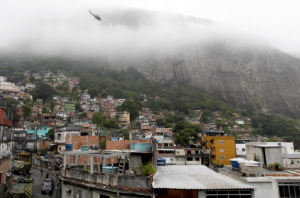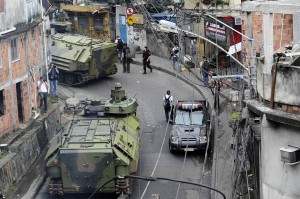The Occupation of Rocinha and Vidigal
By Sarah de Sainte Croix, Senior Contributing Reporter
RIO DE JANEIRO, BRAZIL – In what is being painted as a historic victory for peace in Rio de Janeiro, in the early hours of Sunday morning, police and military security forces moved into some of the last remaining gang-controlled favelas in the city’s Zona Sul (South Zone). Rocinha, Brazil’s largest favela famous for its awe-inspiring scale and geography as well as the heavily-armed traficantes, is now occupied.
In an operation that lasted just two hours and passed without a single gunshot being fired, the neighboring favelas of Rocinha, Vidigal and Chácara do Céu were invaded by around 3,000 security personnel including military and civil police officers, federal traffic officers and naval soldiers.
Supported by approximately nineteen tanks and armored vehicles, nine helicopters and an assortment of other police vehicles, the occupation began in earnest at around 2:30AM on Sunday when police blocked off all the access routes into the communities. Just after 4AM the first tanks rolled into Rocinha and Vidigal and helicopters began to circulate overhead.
Eyewitness reports say that the favelas were eerily quiet on Saturday night. “Everybody stayed inside. The usual weekend parties didn’t happen. Everybody was waiting to see what would happen next,” one Rocinha resident said.
According to Stewart Alsop, a Californian living in Vidigal, “At around 2:30AM the traffickers started putting up road blocks. There was one road block that consisted of a line of trash about one meter high. Another one that consisted of old mattresses and motorcycles…it seemed extremely likely that the traffickers would put up some sort of fight.”
But the anticipated firefight never happened, and by around 6AM the communities were declared occupied. At 12:45 in the afternoon the next day, Brazilian and Rio State flags were being symbolically hoisted in the center of Rocinha.
Alsop speculates, “After the leadership of the gangs were arrested or escaped [earlier in the week]…the only traffickers left were small time managers and street soldiers…these young men had only three options on Sunday: hide, go to prison, or die.”

A helicopter circles the steep banks of Rocinha during the Sunday occupation operation, photo by Marino Azevedo/Imprensa RJ.
According to the most recent reports, just six men were arrested (in addition to those arrested earlier in the week), and more than 100 types of weapons; 43 rifles, two rocket launchers, a submachine gun, as well as almost half a ton of drugs and 75 motorcycles have been seized.
They also discovered human remains at a location at the top of Vidigal which, according to residents, was being used by traffickers as a clandestine cemetery.
Reports vary as to the feeling in the communities following Sunday’s operation. Some reported feelings of euphoria and liberation, and crowds gathering to express their gratitude to the police. But there have also been more cautious comments, describing “a tense acceptance of the new order.”
Alsop says, “This part of the city has been generally ignored by the government and the residents are extremely distrustful of the police, who are viewed as corrupt. People are worried about the rising cost of living that will come with pacification…[but] the main fear that the residents have is that the drug dealers will come back.”
Zezinho, who grew up in Rocinha and operates a favela tour business and a DJ school, says, “My fear is what will happen after the Olympic games? The police will leave and then the traffickers come back and there will be a war for the favela again.”


No comments:
Post a Comment